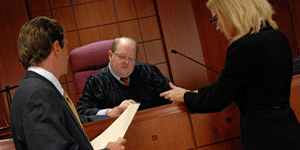Common Estate Planning Mistakes
There are two common estate planning technique mistakes that we see in our office all the time.
They are Payable on Death (POD) and Joint Tenancy with Right of Survivorship (JTWROS).
Payable on Death (POD): A POD account is a financial account, such as a bank account or investment account, where an individual designates a beneficiary who will receive the funds in the account upon the individual’s death. This technique can be an effective way to ensure that assets are transferred to the designated beneficiary without the need for probate. However, POD accounts do not provide asset protection, and the funds in the account may be subject to creditors’ claims or lawsuits. Additionally, if the beneficiary has passed away, and then the owner passes away, there will still be a probate.
Joint Tenancy with Right of Survivorship (JTWROS): JTWROS is a type of ownership where two or more individuals own a property or financial asset together, and upon the death of one of the owners, the surviving owner automatically assumes full ownership of the asset. JTWROS can simplify the transfer of assets upon death, but it can also have unintended consequences. For example, if one of the joint owners incurs debt or is sued, the asset may be subject to creditors’ claims or judgments. Additionally, if the surviving owner remarries or dies, the asset may be transferred to an unintended party.
To avoid the unintended consequences of POD and JTWROS, individuals should consider using a comprehensive estate plan that includes a will, trusts, and powers of attorney. These estate planning tools provide more control over the distribution of assets and can help protect assets from creditors and ensure that they are transferred to the intended beneficiaries.
In conclusion, POD and JTWROS are estate planning techniques; however, they also have limitations and potential drawbacks. Individuals should consider their unique circumstances and seek the advice of an estate planning attorney to determine the best estate planning techniques for their needs.
Estate planning mistakes can lead to unintended consequences and create difficulties for loved ones after a person’s death. Some common estate planning mistakes include:
- Failing to plan at all
- Not reviewing or updating your plan regularly
- Not considering the potential impact of taxes
- Not properly funding trusts
- Not naming beneficiaries for retirement accounts and insurance policies
- Not considering the needs of beneficiaries with special needs
- Not coordinating with beneficiaries
- Not considering the potential impact of second marriages
- Not considering the potential impact of blended families
- Not considering the potential impact of digital assets
Actions to take to correct mistakes
Problem – Failing to create a trust: Not having a trust can result in the distribution of assets in a manner that is not in line with the individual’s wishes.
Solution – Create a trust: A trust is the foundation of a comprehensive estate plan
Problem – Neglecting to update estate plan: Estate plans should be updated regularly to reflect changes in circumstances, such as the birth of children, marriage, or divorce.
Solution – Update estate plan regularly: Review and update estate plan to ensure that it reflects current circumstances and wishes
Problem – Not considering tax implications: Estate taxes can have a significant impact on the distribution of assets. It is important to consider tax implications when creating an estate plan.
Solution – Consider tax implications: Consult with a tax professional or estate planning attorney to understand the tax implications of estate planning decisions.
Problem – Failing to plan for incapacity: Incapacity can result in the appointment of a guardian, which may not be the individual’s desired outcome. outcome.
Solution – Estate planning tools, such as a power of attorney and a living will, can help avoid this
Problem – Relying on POD and JTWROS without a comprehensive estate plan: POD and JTWROS can simplify the transfer of assets upon death, but they also have limitations and potential drawbacks. It is important to consider the potential consequences and use these techniques in conjunction with a comprehensive estate plan.
Solution – Seek the advice of an estate planning attorney: Estate planning can be complex, and it is important to seek the advice of a professional to ensure that all legal requirements are met and that estate planning goals are achieved.
In conclusion, estate planning mistakes can result in unintended consequences and create difficulties for loved ones. To avoid these mistakes, individuals should create a comprehensive estate plan, regularly update it, consider tax implications, plan for incapacity, and seek the advice of a professional.
It’s always important to consult a professional to guide you with your estate planning.
Practice Areas
Estate Planning
Estate planning is the process of establishing a Trust, Will, Durable Power of Attorney, and other related documents during your lifetime.
Estate Administration
Probate
Probate is the legal proceeding supervised by the Superior Court used to transfer title to assets when a person is deceased.
Estate Litigation

Advanced Estate Planning
Families with substantial estates require additional strategies beyond a typical Estate Plan to reduce and offset Estate Tax liabilities.

Conservatorship
Our Locations
The quickest way to get assistance is to contact us directly at 310-316-2400 or by emailing us at info@ledwitzlaw.com.
Life Events

New Families

Nearing Retirement

Recent Loss
Recent Blogs
Digital Assets and Estate Planning
When estate planning for digital assets, it’s important to consider the following: Identify what digital assets you have: This includes social media accounts, email accounts, online banking and investment accounts, and any other digital assets that may have financial or sentimental value.
Determine who will have access to the assets:
Can a Single Person create a Revocable Living Trust?
Yes. A single person can create a Revocable Living Trust. The more important question is “Should a Single Person create a Revocable Living Trust?” The answer to that is also a resounding, YES! In fact, it is much more important for a single person to...
WHAT IS “ASSISTED” LIVING?
As we, our parents and relatives age, their ability to live independently eventually becomes unsafe, unrealistic—or both. One option in having them avoid the very real possibilities of household accidents and injuries can be found in convincing our elder loved ones to...
Client Reviews
As Seen in...

Awards, Certifications and Accolades







